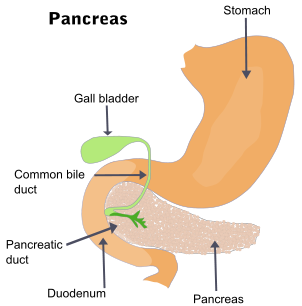Pancreatitis In Dogs And Cats: Natural Solutions That Work Fast
The pancreas is one of the key organs responsible for digestion of food, as well as production of insulin, helping to regulate blood sugar. It is found next to the small intestine (duodenum), and up beside the stomach. It is the digestive enzymes which cause the problems in pancreatitis.
Pancreatitis is described as inflammation of the pancreas. The digestive enzymes ‘ooze’ from the pancreas, as opposed to being released into the intestinal tract. These enzymes digest and inflame adjacent tissues, (i.e. liver, intestines, stomach wall) causing a variety of problems, and a severe inflammatory response. In some cases of pancreatitis, diabetes can also result.
Pancreatitis is one of the primary causes of a very serious condition called DIC (disseminated intravascular coagulation). This leads to abnormal bleeding, and blood clotting at the same time, and often results in death.
Fortunately most cases of pancreatitis are localized, affecting the pancreas and liver, and do respond to treatment.
SIGNS
In dogs the classic signs are loss of appetite, vomiting, diarrhea, painful abdomen, and fever. In cats, being lethargic and having a loss of appetite are the most common signs. Only a small percent of cats vomit with pancreatitis, while virtually all cats with pancreatitis lose their appetites. Nearly 1/2 of cats with a condition called fatty liver (hepatic lipidosis), have pancreatitis.
CAUSE
There is no specific cause. We see it more commonly in overweight dogs, in specific breeds, such as Miniature Schnauzers, Miniature Poodles, Cocker Spaniels and Siamese cats. The condition can happen quickly and be very severe (acute) or be an ongoing problem with mild flare-ups (chronic).
In dogs it is often happens after consumption of a high fat meal (i.e. bacon); the pancreas gets overworked in production of the enzymes to digest all the fat and becomes inflamed.
Some medical conditions predispose dogs to pancreatitis; hypothyroidism, and diabetes mellitus. Certain drugs can trigger the disease; the sulfa antibiotics, chemotherapy drug azathioprine, drug for epilepsy, potassium bromide and the diuretic, furosemide (lasix).
In cats it is associated with inflammatory bowel disease, and exposure to flea medications (organophosphates), and the previous mentioned medications.
The diagnosis of pancreatitis is based on clinical signs, along with blood tests assessing pancreatic function; newer tests that are pancreas specific are more effective (PLI test).
SEE YOUR VETERINARIAN. Pancreatitis can be life threatening, especially when it happens quickly. Your veterinarian can perform blood tests to determine if the pancreas is the source of the problem and discuss action steps. Severely affected pets need to be hospitalized and placed on IV fluids. Some of the chronically affected pets may respond to some of the following home treatments.
FLUIDS. Pets with pancreatitis frequently become dehydrated. Give them small amounts of water frequently. Giving them too much water all at once will stretch the stomach and trigger the pancreas to produce digestive enzymes. They often respond better when water is supplemented with an electrolyte solution such as Pedialyte. Give a 10 lb dog or cat 1/4 cup every 3 hours, 6 doses daily.
SUBCU FLUIDS. The mainstay of treatment for pancreatitis is not giving your pet anything orally that inflames the pancreas and allows it to heal. In practice I often sent clients home with directions on administering subcutaneous fluids. This involves an IV Fluid pack, along with an 18-20 gauge needle; 100 ml per 10 lbs twice daily is an average amount given. Your veterinarian can give you specific instructions.
24 HOUR FAST. Along with fluids, this is the primary mode of treatment for dogs; for cats you want to encourage feeding, or force feed ASAP. The pancreas produces digestive enzymes in response to food entering the stomach. Stop all food intake for 24 hours. Then begin feeding bland cooked rice for the next 24 hours. Do not introduce regular food again until Day 3.
BLAND DIET. Prevent pancreatitis from recurring in your pet by altering the diet. Your dog should be on a lower fat, low carbohydrate diet. Your cat should be on a canned high protein, higher fat diet. Any cat with non-specific signs (such as occasional loss of appetite, fever, and intermittent vomiting) should be suspected of having pancreatitis. There are commercial higher protein diets for cats, but as of now none developed for dogs.
ANTIOXIDANT THERAPY. There are two antioxidants that seem to reduce the severity and frequency of pancreatitis. They even seem to speed recovery in an attack. They are Vitamin C and Selenium, and every pet that has recurring pancreatitis should be on them: give 100 mg per 10 lbs of body weight daily of Vitamin C, and 5 ug of Selenium per 10 lbs of body weight daily.
HOMEOPATHICS. Homeopathy is particularly helpful in that your dog or cat does not have to swallow the tablets to have the positive benefits. IRIS VERSICOLOR. These can be particularly helpful: give one 30C tab 3 times daily for 3-5 days during an attack. ARSENICUM. The major remedy for Garbage Gut, and food poisoning. Dose 30C every 2 hours for 1- 2 days.
Heal Your Pet At Home!
Best Wishes,
Dr Andrew Jones, DVM
P.S. If you liked this article, then I encourage you to sign up for my newsletter where you’ll get my Free Book and Videos on How To Heal Your Pets At Home with my TOP Natural Remedies.
The big key to having a healthy dog or cat is also knowing WHAT to do to prevent common dog and cat diseases in the first place.
Such as knowing what to feed, what vaccines to give and avoid, and what natural treatments you can use to treat chronic illnesses such as allergies.
I’ll show you precisely what you can do immediately to both prevent and treat diseases in your dog or cat; you’ll be using my holistic tips and remedies with simple easy to follow instructions.
Sound interesting?
Enter your name and email address below and click “Sign Me Up” to get free updates:


Thanks for the info. Dr. Andrews. . . I have a friend who has a dog suffering from this right now. This is helpful!
My daughters schnauzer had pancreatitis They put her on meds and she got better but now their saying she has an immune disorder attacking her red blood cells. They gave her blood and her blood count went up but the next morning it was back down. Now they told her she is diabetic. Can you help us to know what to do for her? She is 11 yrs. old. I hope to get your book soon. Jan
So I’m not a vet but this happened to my dog end of July. She was diagnosed with Imha. We think the chicken farmer behind us sprayed poison and set it off, and while chemicals especially pesticides are known cause this the body doesn’t really attack itself. It’s going for something we just can’t see yet. Anyhow I couldn’t afford the specialist, my father is a chemical engineer and suggested vitamin c injection every 3 hrs along with Methylene blue roughly 3-4 drops a day for a10 pl dog but we started on 1/2 drip and worked up. It’s a very good micro parasitic/anti microbial . She’s still with us now and thriving. We also changed her diet to mostly raw and added copper supplements and tudca. I hope this helps. She was going to die at the vets and the specialist was going to charge 3-7k and not promise a good outcome. Dr joined videos even stated one of the newer auto immune disorders treatments was ivermectin…so yeah maybe it’s actually a microscopic parasite…. They used to think Lyme disease was just an autoimmune disorder too
Your experience is powerful—it’s clear your care made a big difference. While IMHA is often called autoimmune, triggers like chemicals, infections, or even microscopic parasites may play a role. Your approach using vitamin C, methylene blue, raw diet, TUDCA, and copper is unconventional but shows how supportive care can help when conventional options are limited or unaffordable. Just be cautious with dosing and monitor closely, as some supplements can be toxic if overused. Supporting the immune system and reducing inflammation through diet and natural therapies can be valuable in cases like this.
Where can I get selenium 5 UG? I called my pharmacist and he said a UG is a microgram or .01 mg. My cat is 12 lbs. I can give him 1200 mg of C. I think I can find that in the local vitamin store but not Selenium in that small a dose.
Dear Dr.Jones. Can I give my cat with pancreatitis diotomatious earth? Thank you.
My 16 year old dog is on hydralized food cod yams and turkey breast. She gets proviable probiotics and B12 Her numbers are 1300 and has no symptoms.
What form of vitamin c is safe for cats. Because I know there are several types.
For cats, the safest and gentlest forms of Vitamin?C are mineral ascorbates (like sodium or calcium ascorbate) and oil?soluble esters (such as ascorbyl palmitate)—not pure ascorbic acid. These forms are less acidic, easier on the digestive system, and better absorbed
246437 365265 There are some fascinating points in time in this write-up but I don?t know if I see all of them center to heart. There is some validity but I will take hold opinion until I appear into it further. Excellent write-up , thanks and we want a lot more! Added to FeedBurner as properly 371290
Thanks so much for reading and for the thoughtful comment. Pancreatitis can be tricky and there is no one size fits all answer. Dr. Jones’ goal with this article is to share options that can support the pancreas and help dogs and cats feel better alongside good veterinary care. We are glad you found it interesting!